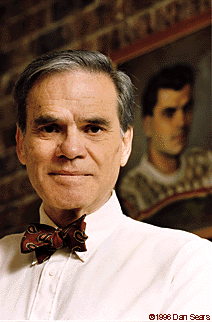 Martin
Rodbell
Martin
Rodbell
 Martin
Rodbell
Martin
Rodbell
Martin Rodbell and his wife, Barbara, were visiting their daughter in Bethesda, Md., when the phone rang at 6 a.m. one October day in 1994. His daughter was reluctant to wake him, but eventually she did, saying, "Someone with a foreign accent wants to speak with Dr. Rodbell."
Rodbell hadn't expected to win the Nobel Prize. "No one should expect such an honor, given the large number of people equally eligible for it," he says.
"Still, as soon as I heard the Swedish accent, I realized something was afoot," Rodbell recalls.
"The voice declared that I had won the Nobel Prize in physiology or medicine and then asked: `Do you accept?'
"The only thought in my mind was, `Do you think I should accept?' followed by a voice saying, `I think you should.'
"Finally I said, `OK, I accept,' and thus ended our conversation. What followed was bedlam."
Now scientist emeritus at the National Institute of Environment Health Sciences, located in North Carolina's "Research Triangle," Rodbell earned his Ph.D. in biochemistry at the UW in 1954 (See The `G' Man in the June 1996 Columns).
He was honored for his contributions in discovering the role of GTP (guanosine triphosphate) in signal transduction, which helps cells respond to hormones. Aberrations in signal transduction can lead to diseases such as cholera and even some kinds of cancer.
He still does research along similar lines. "But I do much more reading and writing, because there is time available and fewer distractions," he says, since he no longer serves as an administrator.
Thanks to the prize money, he was able to shore up his "rather small" retirement income and to help his four children and seven grandchildren.
Rodbell tends to shy away from radio and television interviews. But he enjoys speaking to audiences, especially of younger students, about the value of funding and conducting basic scientific research. He feels strongly that young people should get the message that they can muster what it takes to do science: They don't have to be privileged or extraordinary individuals to make important scientific contributions.
George Hitchings, 1988 Prize in Medicine
Hans Dehmelt, 1989 Prize in Physics
E. Donnall Thomas, 1990 Prize in Medicine
Edwin Krebs, 1992 Prize in Medicine
Edmond Fischer, 1992 Prize in MedicineReturn to the Beginning of "After the Prize"
Send a letter to the editor at columns@u.washington.edu.